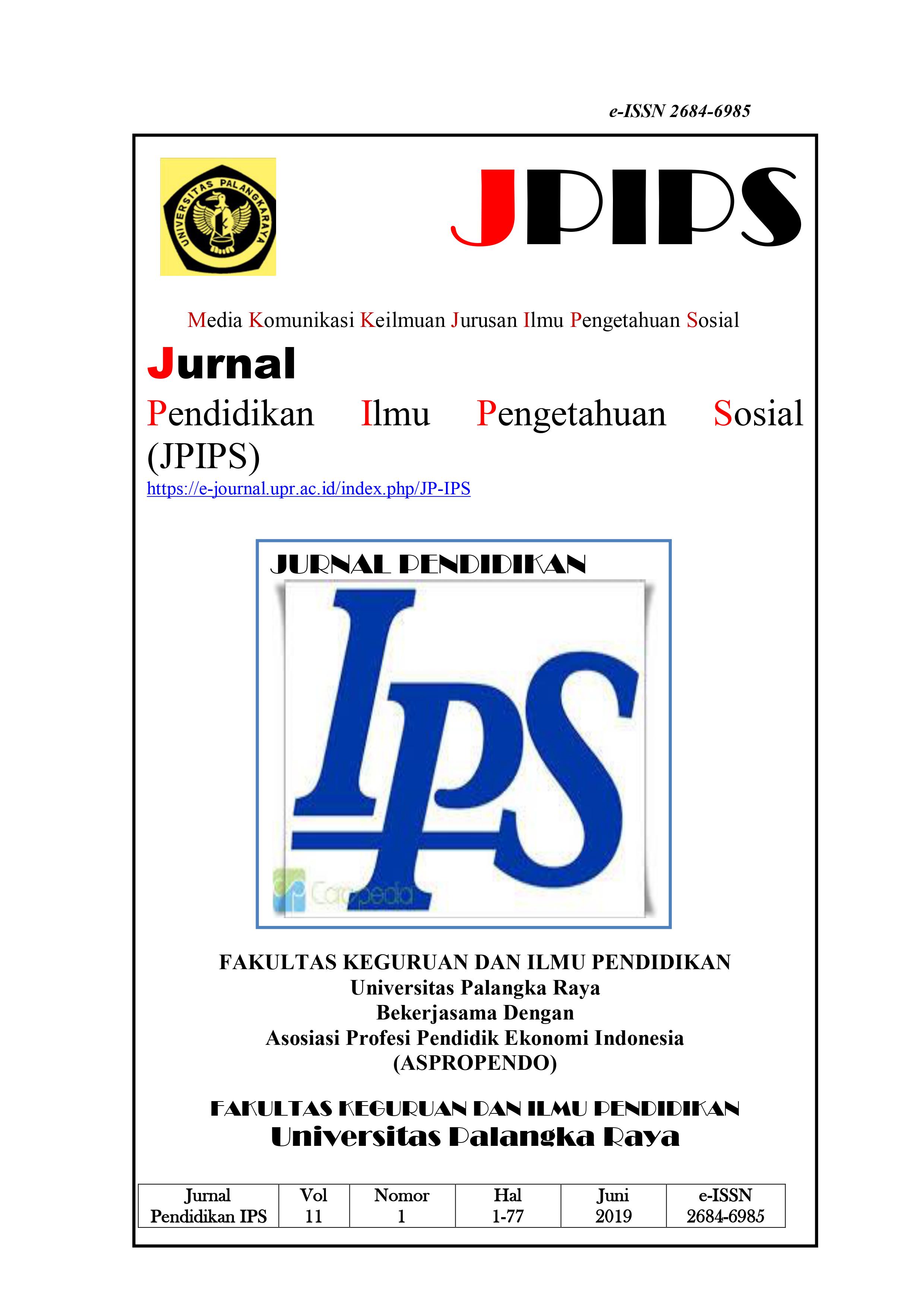Perilaku Sosial Pengurus Badan Eksekutif Mahasiswa Dalam Perspektif Etika Berorganisasi di Tingkat Universitas Palangka Raya
DOI:
https://doi.org/10.37304/jpips.v15i1.9520Keywords:
Organizational Ethics, Organizational Culture, BEM, Palangka Raya University, Student OrganizationsAbstract
The existence of student organizations in tertiary institutions is important in the context of self-development of students themselves. This is confirmed by the Law of the Republic of Indonesia Number 12 of 2012 concerning Higher Education article 77 concerning Student Organizations. There is an imbalance in the ideal organizational paradigm with field facts, the benefits of participating in the BEM UPR organization, the bargaining value of BEM UPR at the external level, as well as perceptions of BEM UPR's social behavior and organizational ethics, became the basis for researchers interested in studying by taking the title of the final project with the theme of ethics, namely " Social Behavior of Student Executive Board (BEM) Management in the Perspective of Organizational Ethics at the University of Palangka Raya Level. This thesis research aims to analyze the relationship between social behavior patterns of BEM UPR in relation to values and culture in work programs as organizational ethics, as well as educational aspects that can be studied therein. The research design uses qualitative methods with a phenomenological approach. The primary data are people who know in depth the social behavior of BEM Palangka Raya University. While the secondary data is the literature in accordance with the author's research title. Data was collected by observation techniques, interviews, and document collection. The results of the research that the authors obtained were the existence of an ethical culture in organizations. This culture is used for decision making both leaders and members of the organization. Perceptions of the BEM of Palangka Raya University as described in the research results tend to be more positive, because students make their circle of communication in the form of groups. Contextual factors play a role in providing encouragement or motivation for action. In the organizational culture at BEM, University of Palangka Raya, values and norms as important elements can be seen both in real and latent phenomena.
Downloads
References
Amrizal. 2004. Pencegahan dan Pendeteksian Kecurangan oleh Internal Auditor. Jakarta: Direktorat Investigasi BUMN dan BUMD Deputi Bidang Investigasi.
Basrowi & Suwandi. (2008). Memahami Penelitian Kualitatif. Jakarta: Rineka Cipta.
Dahar, Ratna Wilis. 2007. Teori-Teori Belajar dan Pembelajaran. Jakarta: Erlangga.
Desmita. 2009. Psikologi Perkembangan Peserta Didik. Bandung. PT Remaja Rosdakarya.
Donnelly, Gibson. (1996). Organisasi, Prilaku, Struktur, Proses. Jakarta: Erlangga.
Edwards C. 1990. Microbiology of Extreme Environtments. New York: McGraw
Endah, Nur Hadiati. 2014. Perilaku Pembelian Kosmetik Berlabel Halal oleh Konsumen Indonesia. Jurnal Ekonomi dan Pembangunan Pusat Penelitian Ekonomi, LIPI , Vol 22, No. 1.
Greenleaf, R. K. (1977). Servant Leadership: A Journey Into The Nature Of Legitimate Power And Greatness. Mahwah, NJ: Paulist Press.
Hasan, M. Iqbal. 2002. Pokok-Pokok Materi Metodologi Penelitian dan. Aplikasinya. Jakarta: Penerbit Ghalia Indonesia.
Hunt, S.D., Wood, V.R. and Chonko, L.B. (1989). Corporate Ethical Values And Organisational Commitment In Marketing. Journal of Marketing, Vol. 53 No. 3, pp. 79-90.
Ikhsan, Sukardi, dan YM Adinda. (2015). Faktor – Faktor yang Mempengaruhi Terjadinya Kecurangan (fraud) di Sektor Pemerintahan Kabupaten Klaten. Accounting Analysis Journal AAJ 4 (3).
Johnson, Doyle Paul. 1986. Teori Sosiologi Klasik dan Modern jilid 1. Jakarta: Gramedia.
King, Laura A. (2010). Psikologi Umum: Sebuah Pengantar Apresiatif. Jakarta: Salemba Humanika.
Kosasih. (2016). Peranan Organisasi Kemahasiswaan dalam Pengembangan Civic Skills Mahasiswa. Bandung: Jurnal Pendidikan Ilmu Sosial, Vol. 25, No. 2, Edisi Desember 2016, hlm: 64-74
Muhlis, Alis dan Norkholis. 2016. Analisis Tindakan Sosial Max Weber Dalam Tradisi Pembacaan Kitab Mukhtashar Al-Bukhari (Studi Living Hadis). Vol 1. UIN SunanKalijaga Yogyakarta.
Munawir. (1997). Auditing Modern, edisi pertama. Yogyakarta: BPFE.
Musfiqon. (2012). Metodologi Penelitian Pendidikan. Jakarta: PT. Prestasi Pustakaraya.
Oviyanti, Fitri. (2016). Peran Organisasi Kemahasiswaan Intrakampus dalam Mengembangkan Kecerdasan Interpersonal Mahasiswa. Journal of Islamic Education Management, Vol. 2 No. 1, Juni 2016, hlm: 6-79
Paine, L. Sange. (1994). Managing Organizational Intergrity. Harvard Business Review, 72(2), Hlm. 106-117
Prawira, Nanang Ganda. (2004). Pengantar Estetika. Bandung: Rekasaya Sains.
Putrayasa, Ida Bagus. (2013). Landasan Pembelajaran. Bali.Undiksha Press.
Salim, Agus. 2002. Perubahan Sosial: Sketsa Teori dan Refleksi Metodologi Kasus Indonesia. Yogyakarta: Tiara Wacana
Sarwono, Sarlito W. & Eko A. Meinarno. (2009). Psikologi Sosial. Jakarta: Penerbit Salemba Humanika
Sarwono. (2007). Psikologi Remaja. Jakarta: Raja Grafindo Persada.
Schein, Edgar H. (2004). Organizational Culture and Leadership, Third Edition. Jossey: Bass Publishers, San Francisco.
Slavin, Robert E.. (2000). Educational Psychology: Theory and Practice. Pearson Education: New Jersey.
Suardiman, Siti Partini. Metode Pengembangan Daya Pikir dan Daya Cipta. Yogyakarta: FIP UNY.
Sugiarto, Eko. (2015). Menyusun Proposal Penelitian Kualitatif: Skripsi dan Tesis. Yogyakarta: Suaka Media.
Sugiyono. (2019). Metode Penelitian Kuantitatif, Kualitatif, dan R&D. Bandung : Alphabet.
Sukamto. (1991). Pengajaran Etika P rofesional. Makalah yang disampaikan pada Seminar pengajaran Pemeriksaan Akuntansi, PAU UGM.
Sukartik, Dewi. (2015). Efek Penerapan Kode Etik Mahasiswa Uin Suska Riau terhadap Perilaku Sosial-Budaya Mahasiswa. Pekanbaru: Jurnal
RISALAH, Vol. 26, No. 1, Maret 2015, Hlm: 15-22
Sulistyarini, D., Novareza, O., & Darmawan, Z. (2018). Pengantar Teknik Manufaktur untuk Teknik Indusri. Malang: UB Press
Susanto, Ahmad. 2011. Perkembangan anak Usia Dini. Jakarta: Kencana.
Syam, Nina W. (2012) .Psikologi Sosial sebagai Akar Ilmu Komunikasi. Cet. I. Bandung: Simbiosa Rekatma Media.
Thilbaut, John W. & Harold H. Kelley. (1959). The Social Psyckology of Group. New York: John Wiley & Sons.
Trevino, L. K., & Youngblood, S. A. (1990). Bad apples in bad barrels: A causal analysis of ethical decision-making behavior. Journal of Applied psychology,75(4)
Weber dalam A.A.G. Peters dan Koesriani Siswosoebroto. 1988. Perkembangan Hukum Modern dan Rasional: Sosiologi Hukum Max Weber dalam Hukum dan Perkembangan Sosial, Buku Teks Sosiologi Hukum, Jakarta: Pustaka Sinar Harapan.














